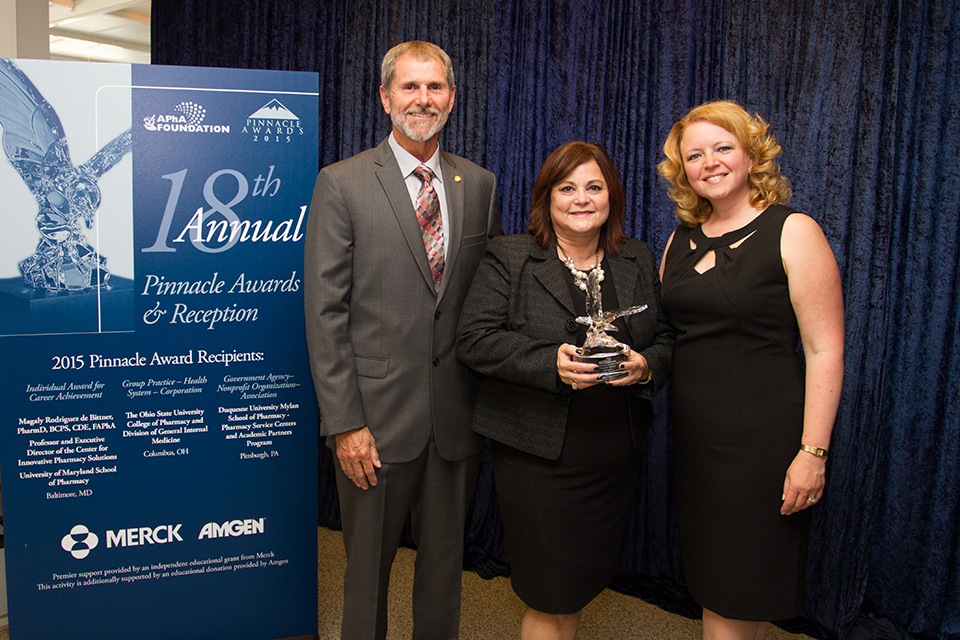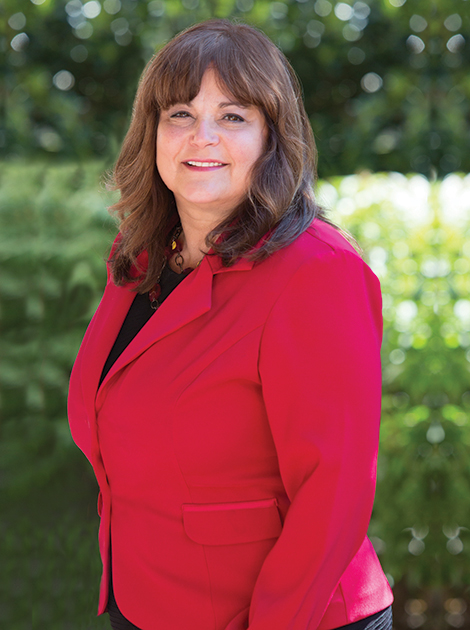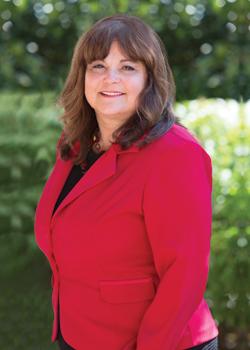Rodriguez de Bittner Named 2013 Founders Week Entrepreneur of the Year
Magaly Rodriguez de Bittner, PharmD ’83, BCPS, CDE, FAPhA, professor and chair of the Department of Pharmacy Practice and Science, recognized for her work as director of the Center for Innovative Pharmacy Solutions.
By Chris Zang
October 7, 2013
If you think of pharmacy as the kindly, old druggist with his mortar and pestle at the corner drugstore, think again. Better yet, think of Magaly Rodriguez de Bittner, PharmD ’83, BCPS, CDE, FAPhA, the University of Maryland, Baltimore’s 2013 Entrepreneur of the Year. She exemplifies the pharmacist of today.
As professor and chair of the Department of Pharmacy Practice and Science at the University of Maryland School of Pharmacy, Rodriguez de Bittner has replaced the tools of yesteryear with such cutting-edge innovations as ThinkEHRx, an electronic health record system, and the CIPS Knowledge Enterprise, which conducts online advanced clinical training for pharmacists.
And the tools of her trade are not housed in the neighborhood drugstore. They reside in places like the School’s Center for Innovative Pharmacy Solutions (CIPS), which Rodriguez de Bittner launched in 2008 and the Maryland P3 (Patients, Pharmacists, Partnerships) Program, which began in 2006 with one employer in Western Maryland and now serves hundreds of patients in the US.
A social entrepreneur, astute businesswoman, patient advocate, outstanding clinician, dedicated team player, innovative pioneer, and yes, a devoted practitioner of pharmacy, Rodriguez de Bittner has generated enormous gains in health outcomes and health care savings.
And she’s proud of how pharmacy has evolved.
“It is a no-brainer that expanding and enhancing the role of the pharmacist to solve drug-related problems and to work as part of the health care team will make a difference in improving health outcomes and reducing unnecessary drug misadventures,” she says. “We need to continue to advocate so medication therapy management services are incorporated as an essential paid component of every patient’s health care plan benefits and so pharmacists are recognized as health care providers and compensated for their services.”
Compensation is just one area in which Rodriguez de Bittner has made inroads. She developed a pharmaceutical care center in Giant Pharmacies in the early 1990s that was the first of its kind to gain American Diabetes Association recognition for diabetes education. It also was the first retail setting where a pharmacist was able to secure a Medicare provider number for reimbursement of cognitive services for diabetes education.
“Prior to Dr. Rodriguez de Bittner’s work, chronic disease management and reimbursement was unheard of in community pharmacy,” says Natalie D. Eddington, PhD, FAAPS, FCP, dean and professor of the School. “Today, there are hundreds of pharmacies within the state and elsewhere with similar programs that generate revenue as a result of her groundbreaking efforts.”
Another notable Rodriguez de Bittner endeavor is CIPS, which has become a national resource center in developing innovative patient care and business solutions to health problems.
”This center, a collective effort of faculty, staff, and students at the School of Pharmacy, is dedicated to the development of new ideas and innovative solutions to the health care needs of patients with chronic diseases,” Rodriguez de Bittner says. “In this capacity, we develop and create innovative patient care programs that are national models.”
One of those “innovative patient care programs” is the Maryland P3 initiative. A pharmacist-delivered chronic disease management program implemented at worksites in Maryland, Georgia, Texas, Virginia, Louisiana, and California, P3 has gained national acclaim, including the 2010 Pinnacle Award from the American Pharmacists Association (APhA) Foundation and recognition by the Centers for Disease Control and Prevention as an example of how pharmacists can partner with other health care professionals to make a difference in patient care.
“Maryland P3 is a visionary program that combines the clinical applications of medication management and disease state monitoring with the business applications required for ongoing viability in the health care marketplace,” says Anne Burns, RPh, vice president of the APhA. “The innovative leadership of Dr. Rodriguez de Bittner and her colleagues has been instrumental in the development of this program that targets uncontrolled patients with diabetes and other conditions using a collaborative patient-centered approach.”
P. Kenyon Crowley, MBA, MS, CPHIMS, deputy director of the Center for Health Information and Decision Systems at the University of Maryland’s Robert H. Smith School of Business, says one large P3 client reported a savings of $2,136 per participant and a 22 percent decrease in the number of emergency department visits and hospitalizations for individuals participating in the program.
“As the US continues to seek innovations and evidence-based methods to bend the cost curve of health care, the P3 Program presents a viable model,” he says. “Further, in recognition of the unique information management needs of the P3 Program, Dr. Rodriguez de Bittner and her colleagues conceived and launched a pharmacist-centric electronic health record [EHR], the ThinkEHRx. This EHR provides capabilities to improve the often fragmented and disconnected nature of information sharing and care coordination in the US health care system.”
Rodriguez de Bittner and her colleagues, through creation of a public-private partnership, spearheaded the launch of the CIPS Knowledge Enterprise, an online, asynchronous platform for provision of care management training for high-risk chronic diseases. “The platform, which allows real-time, point-of-care feedback from School of Pharmacy faculty to trainees, has revolutionized pharmacy practices across the mid-Atlantic region,” says William Cooper, MBA, senior associate dean for administration and finance at the School of Pharmacy.
Health care reform opens another door for medication therapy management, Rodriguez de Bittner says. “My hope is that CIPS becomes the place to go about anything related to patient care and pharmacists services. We want to create models that transform the practice of pharmacy and health care.”
In addition to thinking out of the box, Rodriguez de Bittner also extends geographic borders. She has traveled extensively in Latin and South American countries to consult on pharmaceutical education and clinical pharmacy services. Moreover, she was the first pharmacy professor to require that students develop formal business plans for implementing new pharmacy services. This concept was presented at a national forum and has been adopted by other schools.
Rodriguez de Bittner says addressing the business side of health care is imperative. “It is clear that patient programs cannot succeed if they are not sustainable,” she says. “For any enterprise to succeed, there has to be a way for services to be paid for.”
Colleagues rave about her business acumen and attention to detail.
“As executive director of CIPS, Magaly ensures that every program plan is accompanied by realistic and sustainable business plans,” says David Stewart, MD, MPH, associate professor and chair of family and community medicine in the School of Medicine. “Based on scientific evidence and crafted to dovetail with health care reform incentives, her practice plans include a win for the patient, a win for the practice setting, a win for the primary care provider, and a win for the field of pharmacy.”
Speak to Rodriguez de Bittner, however, and she humbly says she is the winner.
“I am so lucky to have had the opportunity to do what I love and to have colleagues and a University that have embraced my love for innovation and entrepreneurship,” she says.
As part of this distinguished recognition, Rodriguez de Bittner will deliver her “Entrepreneur of the Year” lecture on October 14, at 4:00 p.m. in room N103 at the School of Pharmacy. This lecture is open to the public and all members of the campus community are invited to attend.



